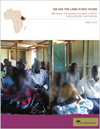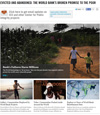-
The Dark Side of Development: Displacement, Eviction in World Bank Projects and Ethiopia
May 13, 2015 By Theo Wilson With the help of international aid, foreign land grabs in the Gambella region of Ethiopia have resulted in environmental degradation, more severe economic and social inequality, and human rights abuses, according to a new study by the Oakland Institute. We Say The Land Is Not Yours collects testimony from victims of “villagization,” a policy of forced displacement started under the military Derg dictatorship and, according to many, continued to this day under the guise of land investment. The ultimate aim, according to the report, is to resettle up to 1.5 million people. Land cultivated for generations is being degraded by industrialized agriculture in hopes that foreign currency entering the economy will improve infrastructure, create jobs, and “have beneficial trickle-down effects,” the authors say. Communication between the government and locals has been limited to false promises of employment and compensation, according to the report, and victims are silenced out of fear of torture, imprisonment, or death. The Ethiopian government responded to the report, saying the accusations don’t provide sufficient detail to be verified and the “vast majority of Ethiopians have benefitted from the growth and sustainable development program.”
With the help of international aid, foreign land grabs in the Gambella region of Ethiopia have resulted in environmental degradation, more severe economic and social inequality, and human rights abuses, according to a new study by the Oakland Institute. We Say The Land Is Not Yours collects testimony from victims of “villagization,” a policy of forced displacement started under the military Derg dictatorship and, according to many, continued to this day under the guise of land investment. The ultimate aim, according to the report, is to resettle up to 1.5 million people. Land cultivated for generations is being degraded by industrialized agriculture in hopes that foreign currency entering the economy will improve infrastructure, create jobs, and “have beneficial trickle-down effects,” the authors say. Communication between the government and locals has been limited to false promises of employment and compensation, according to the report, and victims are silenced out of fear of torture, imprisonment, or death. The Ethiopian government responded to the report, saying the accusations don’t provide sufficient detail to be verified and the “vast majority of Ethiopians have benefitted from the growth and sustainable development program.” A new project from the International Consortium of Investigative Journalists (ICIJ) critically analyzes the World Bank’s safeguards to protect marginalized populations from the negative impacts of its own projects. The result of a year’s worth of research by 50 journalists from 21 countries, the collection of stories claims World Bank-funded projects have displaced an estimated 3.4 million people over the last decade and “financed governments and companies accused of human rights violations such as rape, murder, and torture.” In Ethiopia, ICIJ claims officials siphoned millions of dollars from the bank’s investments in health and education to fund mass eviction campaigns. Citing current and former Bank employees, ICIJ says a new safeguard policy released in 2014 would actually “give governments more room to sidestep the Bank’s standards and make decisions about whether local populations need protecting.” Oxfam’s Land Rights Policy Lead Kate Geary said in a response that these findings are supported by the Bank’s internal audits which reveal they “simply lost track of people who had to be ‘resettled.’” She called for the Bank to provide grant funding to those who have been displaced and negatively impacted, and implement fundamental reforms to live up to its own commitments to protect people.
A new project from the International Consortium of Investigative Journalists (ICIJ) critically analyzes the World Bank’s safeguards to protect marginalized populations from the negative impacts of its own projects. The result of a year’s worth of research by 50 journalists from 21 countries, the collection of stories claims World Bank-funded projects have displaced an estimated 3.4 million people over the last decade and “financed governments and companies accused of human rights violations such as rape, murder, and torture.” In Ethiopia, ICIJ claims officials siphoned millions of dollars from the bank’s investments in health and education to fund mass eviction campaigns. Citing current and former Bank employees, ICIJ says a new safeguard policy released in 2014 would actually “give governments more room to sidestep the Bank’s standards and make decisions about whether local populations need protecting.” Oxfam’s Land Rights Policy Lead Kate Geary said in a response that these findings are supported by the Bank’s internal audits which reveal they “simply lost track of people who had to be ‘resettled.’” She called for the Bank to provide grant funding to those who have been displaced and negatively impacted, and implement fundamental reforms to live up to its own commitments to protect people.Sources: International Consortium of Investigative Journalists, Oakland Institute, Oxfam.
 A Publication of the Stimson Center.
A Publication of the Stimson Center.





